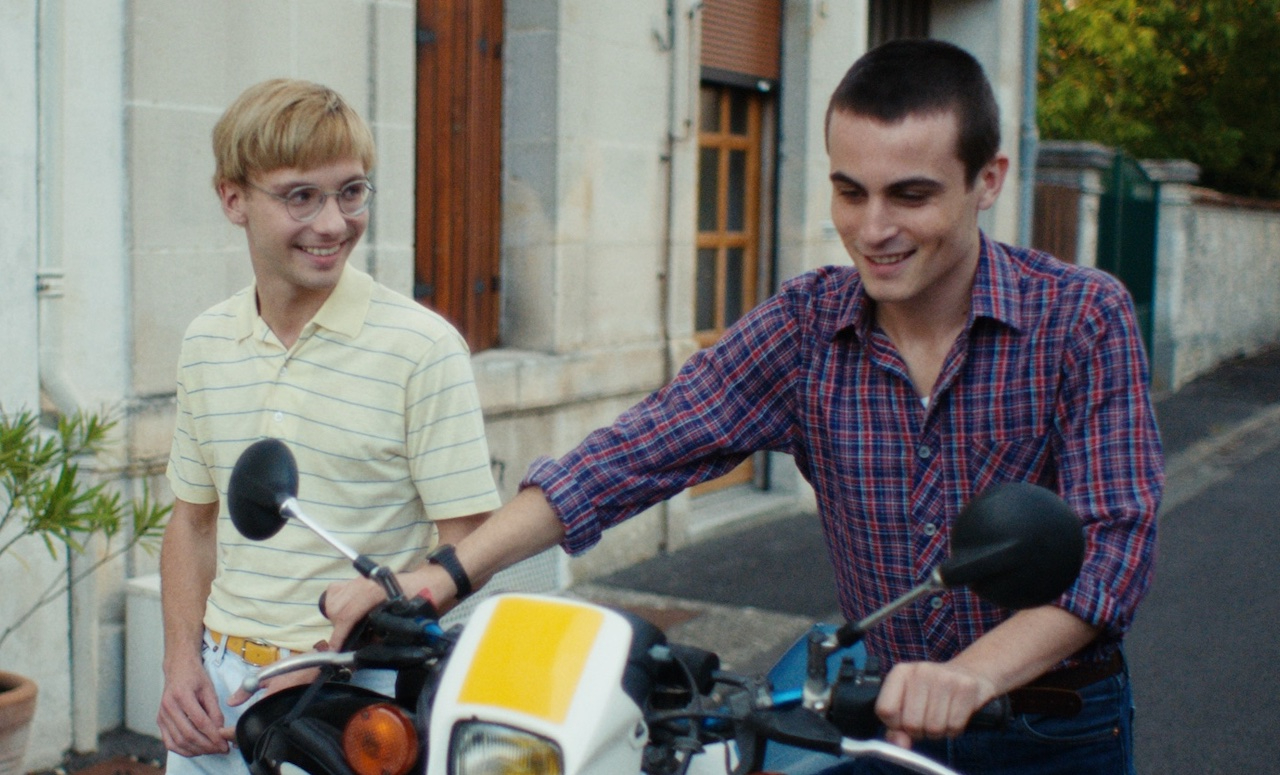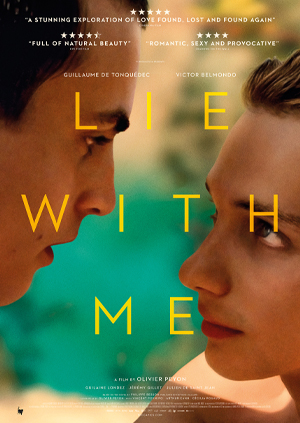“My concern was not to betray the spirit of the novel”: Olivier Peyon on Lie with Me

Lie with Me is the intoxicating, absorbing and surprisingly funny French romantic drama from Olivier Peyon, adapted from the bestselling novel by Phillippe Besson. It follows renowned Stéphane Belcourt (Guillaume de Tonquédec), who returns to his hometown of Cognac after 35 years as the ambassador for a brand of the town’s biggest export. The visit, however, causes buried memories of his adolescence to bubble to the surface, not least due to the fact he bumps into the son (Victor Belmondo, grandson of Jean-Paul) of a schoolmate he shared a passionate clandestine love affair with in his teens – back when homosexuality could be a death sentence. Through flashbacks that intersperse with the action in the present, Peyon reveals the fleeting summer of first love Stéphane (Jérémy Gillet) spent with Thomas Andrieu (Julien de Saint Jean).
As the story of the past is introduced, the film suggests we are firmly in the realm of a coming-of-age, coming-out story, the retro 80s setting stunningly captured in the backdrop and costumes, all awash in the golden haze of summer warmth and nostalgia. But, as the feature progresses, the audience is dragged further and further into the present, where all unravels in contrasting muted hues of wintery grey, and layers of secrets of the past peel away.
With brilliant subtlety, pitch-perfect performances from each of the cast, and a generous dollop of humour amidst the tragedy (no doubt aided by Peyon’s choice of comedy actors for his dramatic roles), the story expands into a study of the concept of storytelling itself, the question of whether stories are indeed lies, as Stéphane’s mother tells him, and how those stories we tell ourselves and others form our sense of identity. It also delicately shows how all-consuming the shame and repression some suffer about their sexual orientation can be, using its comedic tone to point out how we haven’t progressed as far as we might think in allowing people to love as they want. Despite the suffering it unearths, there’s something soothing to be taken from its message that it’s never too late to find healing.
The Upcoming had the chance to chat with Peyon about his approach to bringing the novel to screen, working with his cast, and the universality of its themes.
Hi Olivier, thank you for speaking with us. To begin with, an easy question: what can people expect when they watch Lie with Me?
Wow. Well, I’m not going to talk about my movie, but I can talk about the novel – because it’s [based on] a book, a very famous book in France. And it’s a very moving book about secret family secrets, about the capacity to choose your life, make good decisions, about first love. These are the themes of the book, and I was really moved by them. I tried to do the same with the film. It’s about the encounter between a very famous writer, who is 50 years old, and the son of his first love. The originality is that his first love was a man so, suddenly, you understand that the son is going to realise that okay, his father was gay, or he had a love story when he was young with a boy – with a man – and it’s all about that. I was really moved by this relationship between the writer and the son. It’s not a love story at all, of course, but they suffered so much: the son suffered so much from his father’s silence, and the writer suffered so much from the silence of his first love. Step by step, they each get all the puzzle pieces, and finally, at the end of the movie, they understood what happened, and it’s truly a moving story. The novel is about that.
It’s one of those films that keeps you guessing about exactly what genre we’re in or where it’s going. At some points, in the flashbacks, the focus seems to be on a coming-of-age, coming-out type tale, but then when we’re in the present, it’s a completely different story and set of emotions. Can you tell us a bit about how the adaptation came about? When did you first read the book, and how do you go about translating it to film and capturing all the nuance and layers within it?
In fact, it was the producer who called me one day – I knew the producer – and he told me, “Oh, I just read this book.” And at the time the book, the novel, was not so famous. And the book is mostly about the past, about the teenage love story, and the encounter between the writer and the son is more of a pretext to talk about the past. When I met Philippe Besson for the first time (the novelist – because I didn’t know him before), I told him, “I’m really moved by this idea, the encounter. You wrote a story about the past and I would like to develop the present,” and he liked the idea. Philippe Besson really often was not so focused on the [specifics]. My concern was not to betray the spirit of the novel; but, for all the rest, I was really free to invent lots of things, and I invented lots of things, but to translate the real spirit of the book. So, to answer your question, I decided to develop more the present-day story.
I read that a friend of Besson’s remarked after seeing a screening of the film, “It’s crazy how very much your movie is nothing like the book, while being completely like the book!” – which I guess is an absolute vindication of what you say you wanted to achieve?
Exactly. It was Phillip Besson’s best friend. They were invited for… not the premiere, it was before, when I organised a special screening just for the writer. Because it was an autobiographical story, it was different than when you adapt a classical story. In this case, it was his life – you know what I mean? It was Philip Besson’s life, so it was a little bit more touchy for me. So I organised a screening just for the writer and he asked a best friend of his to come. And that was the sentence the friend told me, and it was really the best compliment. I was really happy about that.
Tell us about your incredible cast. Guillaume de Tonquédec (who plays the older Stéphane) in particular takes us on a rollercoaster of emotions, often conveyed with little dialogue. He really channels the complexity of that character, because he’s not the person who was deeply repressed in terms of his sexuality, even in his youth – and actually in the present he is even more confident on that front – yet he has this past that’s burdened him from his first love. Then, of course, you also have this amazing performance from Victor Belmondo, and the two young actors who play this incredible love story back in the past.
Yeah, I was really lucky with the actors. You know, it’s my sixth film, and I love actors – that’s why I’m making cinema – but this time the five actors (because there’s also Guilaine Londez, who plays the female character) were so involved in the making of the film that I knew my luck. They were really involved. For Guillaume, I’m happy about what you’re saying, because it was quite difficult in a sense. As you say, he doesn’t talk a lot; it’s this kind of part where you have to make the audience understand without saying words, it’s all on your face. So it was not so easy. And the second reason it was not so easy is because Guillaume is really famous in France, but as a comic actor – he plays in big and very popular comedies – so this part was really different from what he usually does, and it was a challenge for him. He’s a great actor, so I was sure he would be really great, but you’re always playing with the image of an actor with the audience. So he had to be… sometimes he’s quite funny in the movie, and tragic, also. He had to balance [those things] and work with all these images he had [in the minds of] the French audience. So I was really, really happy he was really involved in it.
And Victor, he’s the grandson of Jean-Paul Belmondo, who died one or two years ago. And it’s funny because Victor has been acting for ten years in small parts; his career was going step-by-step, and it must have been difficult because his grandfather was so huge. But he was really clear about it, he was not frustrated – and suddenly, he had this big part. It wasn’t his first time, but a very big part. He really loved it and was really also so involved, and I say that because… The shooting was after Covid, and it was really difficult to find money – to find funds – because of the situation in France. I think it was the same in Great Britain. And at one point I thought, “Okay, we’re not going to be able to make it,” and Victor – because he was involved from the start of the casting, Victor was always there – he was ready to play for free. So, as I told you, I was lucky.
And then, in the novel, there is no female character at all, it’s just about the four guys. For so many reasons I wanted to… I wrote this part for Guilaine because I wanted her to be the one to represent the countryside theme. [The difference] between the countryside and Paris is a big, important subject in the book. It’s in every page – it’s not a character – so I had to invent a character to represent this theme, and so I wrote the part for her. And she’s also famous in France as a comic character, and I wanted her to play a more profound character.
And, finally, the two young men, they were a real revelation for me. We started shooting with them, because there were two parts in the shooting: first, at the end of the summer with the young ones, and in the winter the present part, with the adults, because I wanted the past to be sunnier – perhaps melancholic, but with sun, with all these colours – and the present was more from the winter. So I started with the young ones. And I can tell you, they’re 22 now, but at that time, they were 20. We had a huge casting, but when we put them together, it was like… the chemistry, it was really great. I had some other young actors who are great but the magical thing was when they were together, and they were so intelligent about the sex scenes. We talked a lot together, and we built those scenes together. They gave me ideas of what they wanted to do, what they didn’t want to do. They had read the book, so they knew the importance of the scenes. And so I was really lucky.
The film highlights how it’s not strictly black-and-white – that, back in the 80s, you couldn’t easily come out as gay and now it’s perfectly acceptable, but rather that society still has some way to progress. You use humour brilliantly to bring that out, such as the clumsy way those from his old town refer to Stéphane’s sexuality, or the tumbleweed response he gets from the anecdote he tells the American cognac tasters about pastis…
That was a true story! The story with the American and the pastis in the United States. It’s not in the book at all, but it’s a true story of Philippe Besson’s. Because when I was writing, I needed a story about him and his relationship with alcohol, so I called him and said, “Do you have any story about you and alcohol?”. So it was a true story!
You also take us into a new realm as the film progresses, talking about the very idea of storytelling, the lies we perhaps tell ourselves as well as others, how our identity is based on those stories or lies – and that takes the focus beyond this being strictly an LGBTQ+ story. There’s something very universal about that.
Yes, and on the universality of the story, it was the case with the book… I’m not an expert about the number of books Philippe Besson sold, but usually selling 40,000 books is great, but with this one, he sold… I don’t know, 200,000 books? It was really huge. And I think it’s because it’s universal. It’s not just… It’s of course about LGBTQ+ issues, but it’s also more universal as, as you say, it’s more about lies, about making good choices, and it’s also about first love. And when I was in France for screenings – because we got lots of screenings with audiences, I was lucky – and lots of people, straight people, came to me at the end of the screening and they were talking about first love. Lots of old, straight people, they came to the screening and they didn’t know what they were going to see, and at the end they told me, “Okay, I have no gay friends, I don’t know much about that. But it’s the same, you know? The love is the same.” And so I was like, “Okay…”, but it was also very moving. And, as you say, I was like, “Okay, it’s universal.” It’s about love. It’s about all of the things you said before.
Can you tell us what your next project is likely to be?
Yes, I have a few different projects. I’ve been so involved in this one, and I’m really lucky because we have screenings in Great Britain and in Germany, so I’m in the middle of that, but my next movie, which I’m writing, will be a true story. There is a very famous writer, who’s dead now; she was a woman, very popular, but in the 70s people forgot about her. She was the first female publisher in France, and she published erotic literature. But she was censored. It was just after May ’68, but it was not open as we imagine – the society was quite closed, and she had to fight for five years against the power. She fought hard for free thinking. So it’s about her, and I’m in the middle of that, still doing lots of research. But it will be a very beautiful female character.
Sarah Bradbury
Lie with Me is released in select cinemas on 18th August 2023. Read our review here.
Watch the trailer for Lie with Me here:


























Facebook
Twitter
Instagram
YouTube
RSS